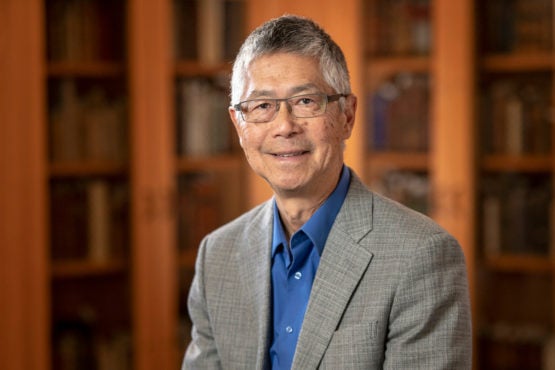Gordon H. Chang to become senior associate vice provost for undergraduate education
Chang, who will assume his new role April 1, succeeds Sarah Church, who joined the Office of the Vice Provost for Teaching and Learning in January 2019.
Stanford History Professor Gordon H. Chang will become the senior associate vice provost for undergraduate education on April 1.

History Professor Gordon H. Chang will become the senior associate vice provost for undergraduate education on April 1. (Image credit: L.A. Cicero)
Harry J. Elam Jr., senior vice provost for education and vice provost for undergraduate education, recently announced the appointment.
Elam said Chang will advise him and assist with the overall management of the Office of the Vice Provost for Undergraduate Education (VPUE), which is home for Stanford Introductory Studies, the Program in Writing & Rhetoric, Undergraduate Advising and Research, the Bing Overseas Studies Program and Residential Programs.
“Gordon brings strong dedication to liberal education and to equity and inclusion for all of our diverse undergraduates,” Elam said. “His broad experience and understanding of Stanford will make him a powerful representative for VPUE with our partners in the university and beyond.”
Chang, who joined Stanford in 1991, said he was honored to be appointed.
“I am thankful for this special opportunity,” he said. “I look forward to contributing to undergraduate education at Stanford, including major initiatives emerging from the university’s long-range planning process.”
Chang succeeds Sarah Church, a professor of physics, who joined VPUE’s leadership team in August 2016. Church was appointed senior associate vice provost in the Office of the Vice Provost for Teaching and Learning in January 2019.
Decades of university service
Chang, who is the Olive H. Palmer Professor in Humanities, has been deeply involved in the betterment of undergraduate education at Stanford, including teaching courses within Introductory Seminars, Sophomore College, Stanford in Washington and the Haas Center for Public Service. He served on the Thinking Matters Governance Board, which is responsible for developing and overseeing the Thinking Matters curriculum.
Chang served as faculty-in-residence for the former Bing Overseas Studies program in Beijing. He has mentored many undergraduate researchers, including at the Center for Spatial and Textual Analysis, a pioneering research hub where participants apply digital tools and methods to create new knowledge in interdisciplinary humanistic inquiry.
Chang also served on the committee that considered the establishment of ethnic studies at Stanford, which resulted in the formation of the Interdepartmental Program in Comparative Studies in Race & Ethnicity, which offers undergraduates the opportunity to major or minor in Comparative Studies in Race & Ethnicity; Asian American Studies; Chicana/o, Latina/o Studies; Jewish Studies and Native American Studies.
Chang served as a founding director of the Asian American Studies program and as a director of the Center for East Asian Studies in the School of Humanities and Sciences. He served on faculty advisory groups for several interdisciplinary programs and was a resident fellow in Castaño, part of the Gerhard Casper Quad.
He is a member of the Faculty Senate, the centerpiece of academic governance at Stanford.
Research, teaching, writing, awards
Chang, who received a bachelor’s degree in history from Princeton University, earned a doctorate in history from Stanford.
His research and teaching focus on historical connections between race and ethnicity in America with a particular focus on trans-Pacific relations, especially the interconnections between East Asia and America. This spring, he will be publishing two books on the history of Chinese railroad workers in North America: The Chinese and the Iron Road: Building the Transcontinental (Stanford University Press) and Ghosts of Gold Mountain: The Epic Story of the Chinese Who Built the Transcontinental (Houghton Mifflin Harcourt).
Chang is the author of several books, including Friends and Enemies: The United States, China, and the Soviet Union, 1948-1972 (1990), Asian American Art: A History, 1850-1970 (2008), and Fateful Ties: A History of America’s Preoccupation with China (2015).
He pursues ongoing research in the fields of Asian American history, U.S. diplomacy, the Cold War, and U.S.-China relations past and present.
Chang received the Kahn-Van Slyke Award for Graduate Mentoring from the History Department in 2014. He received fellowships from the Guggenheim Foundation and the American Council of Learned Societies in 1999-2000, and from the Stanford Humanities Center in 1993-94, 2002-03 and 2010-2011.
